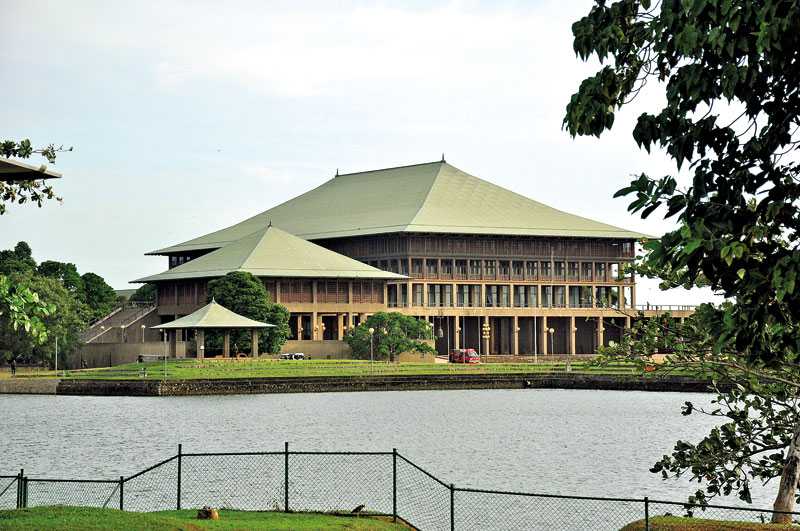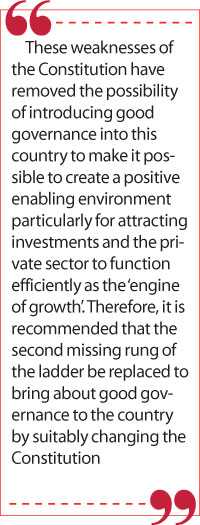Thursday Feb 19, 2026
Thursday Feb 19, 2026
Monday, 10 May 2021 00:00 - - {{hitsCtrl.values.hits}}

The main recommendation is to restore socio-political stability into the country particularly by changing the Constitution to include in it provisions for bringing about reconciliation among the various ethnic groups in the country after discussion with the relevant stakeholders and political parties
 The Government is rightly interested in attracting foreign direct investment (FDI) into our country. The intention of this paper is to discuss ways and means of doing it. The best way, perhaps the only way, is to create an enabling environment to bring about socio-political stability to the country. Since 1956 all political parties have failed to do it by deciding to follow either a religious or a racial political line without making an effort to establish a politically stable and integrated Sri Lankan nation state by suitably changing the Constitution.
The Government is rightly interested in attracting foreign direct investment (FDI) into our country. The intention of this paper is to discuss ways and means of doing it. The best way, perhaps the only way, is to create an enabling environment to bring about socio-political stability to the country. Since 1956 all political parties have failed to do it by deciding to follow either a religious or a racial political line without making an effort to establish a politically stable and integrated Sri Lankan nation state by suitably changing the Constitution.
High level of poverty
Investment is necessary to create employment, especially to reduce the prevailing high level of poverty of 42% of the population of persons earning less than $ 5.5 per day in 2016 compared to 3% in Malaysia and Maldives (2016) and 13% in Mauritius (2017) and 7% in Seychelles (2013) according to the World Bank, while Singapore has not registered any poverty at all; Sri Lanka (SL) is thus the poorest island nation in South Asia. In addition, there could be widespread starvation due mainly to the effects of the COVID-19 pandemic.
Official records indicate that poverty in the country was 4.1% of the total population, (Department of Census and Statistics, 2016). This is a grossly absurd definition of poverty as it ignores basic needs other than food such as clothing, housing, medical attention, etc. Therefore, the poverty level after the pandemic needs to be investigated immediately before making long-term plans for the development of the economy. Inequality of incomes in SL is also problem.
Thus, though accurate figures cannot be given regarding the level of poverty in SL, it appears to be high. The people of SL have been so poor that even women have been pressurised to go abroad and work under conditions bordering on slavery, particularly in the Middle East.
Main strategy – Attraction of investment
The main strategy, that needs to be implemented for this purpose, should certainly be the attraction of a massive inflow of export-oriented investment into the country to create jobs for the increased number of persons without jobs especially in the rural sector and to expand exports mainly to deal with the very heavy foreign debt of $ 56 billion (CBSL, 2019). The problem is that SL has not been able to attract sufficient foreign investments.
 Inability to attract adequate FDI
Inability to attract adequate FDI
It is estimated that if the economy were to grow at 8% per annum, the country has to invest about 35-40% of the Gross Domestic Product (GDP) every year. But SL does not save enough for the purpose; for example, the amount of average domestic savings for the last five years up to 2018 was about 22% of GDP, (CBSL, 2019). This is the justification for SL to attract Foreign Direct Investments (FDI). The other reasons for this are SL does not have the modern technologies required and an adequate knowledge of global markets for export of goods and services produced here. The FDI could provide all these.
But the fact is SL has failed miserably to attract adequate amounts of FDI so far. For instance, by 2019 the country has been able to attract a FDI stock of only about $ 13 billion, (UNCTAD, 2019) apparently in gross terms, while Singapore has been able to attract a stock of about $ 1.7 trillion FDI by 2019! Therefore, the very first thing to do when preparing a future development plan is to find out why SL has not been able to attract FDI like Singapore for instance.
Why? Social and political instability
If one were to compare economic development of the country to a ladder, one can say that that the first few rungs of the ladder are missing. The first missing rung is the continuation of socio-political instability in the country since 1956. Political instability (situation of a country where the potential for sudden change in the leadership and policies is high and so will reduce the confidence of investors and consumers) has been heavy in SL, as it has been ranked at 112 and that of Singapore has been ranked at 3 out of 195 countries, (global economy .com,2019 ) .That is why SL has not been able to attract the large and well known large foreign investors like those listed in the Fortune magazine referred to as ‘the Fortune 500’.
Main cause – Inability to solve the ethnic problem
The main cause for the absence of social and political stability or a better enabling environment for development and of course inadequate investments in the country, could be the inability of the leaders of the past to solve the so-called ethnic problem which has given rise to terrorism particularly a 30-year-war and frequent clashes among the different racial and religious groups in the country, aroused by the introduction mainly of the Sinhala Only policy after 1956, the July 1983 attacks against Tamils and the later attacks against Muslims, by mobs led by extremists of the majority community. The last of such clashes was on Easter Sunday, 2019.
The foreign investors, apparently fear that such clashes may continue to happen and disrupt their projects; it is often said that ‘history repeats itself’. This surely needs a consensus among all political and religious groups to solve the problem once and for all by amending the Constitution suitably to satisfy the minorities. No other solution (even a military solution) could succeed to solve the current problems of low growth, indebtedness and more poverty, as feelings (of hatred) are involved. In other words, SL can still be described as a country populated by several different primitive tribes constantly fighting with each other and not a mature integrated nation state capable of designing and implementing a plan of economic and human development. For these reasons, SL is also not accepted as a decent law-abiding global citizen (vide the recent Geneva resolution against the country).
It should also be mentioned that the absence of peace and socio-political stability has compelled a stream of people to leave our country for good (according to reports some three million or so skilled and professional persons have already left creating some 500,000 vacancies in the various sectors (Department of Census and Statistics,2017).
Solution – Change the Constitution
Therefore, the main recommendation is to restore socio-political stability into the country particularly by changing the Constitution to include in it provisions for bringing about reconciliation among the various ethnic groups in the country after discussion with the relevant stakeholders and political parties.
Absence of good governance
Another missing bottom rung in the ladder is the absence of good governance and ineffectiveness of government, the rank for SL for which was 98, while the rank for Singapore was 1 out of 193 countries, (global economy.com, 2019). This along with the absence of social and political stability prevents the attraction of investments as investors for instance fear that the prevailing system may not allow them to take effective legal action in the case of a dispute in the absence of a proper judicial system or that policies may change from time to time on the whims and fancies of the leaders of a country.
The absence of good governance is mainly due to the many weaknesses in the various constitutions that have been installed in SL particularly since 1972. (Good governance includes a) participation or freedom of speech and association by the people, b) rule of law by an impartial body, c) responsiveness or dedication of Members of Parliament (MPs) to serve the needs of the people, d) consensus or agreement by MPs on basic principles and policies to serve the needs of the people, e) equity or equal rights for all irrespective of race, religion and caste, f) effectiveness and efficiency of government and public institutions, g) accountability or indication of who is responsible for what and their actual performance and h) predictability or consistent application of policies).
These weaknesses of the Constitution include mainly the lack of attention to checks and balances required to create a degree of independence of the three wings of government such as the legislature, the judiciary and the executive for parliament to function efficiently to carry out the will of the people. The executive consists of the cabinet of ministers and the public service. The cabinet of ministers itself is drawn from the parliament conflicting with the principle of checks and balances between the two parts of the government involved; in the USA cabinet ministers are professionals of repute.
Still another major conflict with this principle is the grant of special powers to the president of the republic as in the case of the amendments of the Constitution of SL in 1978, 2010 and 2020; in such cases the parliament elected by the people to rule the country becomes a mere tool to be used by the President of the Republic as he or she wishes and not of those of the members of parliament. This has been made worse by the disappearance of the Constitutional Council (CC) in the 20th Amendment along with the other independent commissions.
Worse still the 1972 Constitution took away the right of appointment and promotion of officials of the public service which is a part of the executive by an independent commission by introducing article 55 (i). This has been repeated in all the subsequent constitutional amendments including the 20 A, which does not include any independent commissions.
Another weakness of the Constitution has been the tendency on the part of members of parliament to resort to bribery and corruption particularly due to the prevailing district system of elections which leads to large campaign expenditure by the candidates who when elected try to earn it back illegally by using budgetary allocations when elected. Political parties are certainly institutions that play an important role in national and economic development. Strangely, however, there is no reference to the role of political parties in the governance of the country in the constitution.
For example, there is no mention as to how they should select candidates for election, how they should be held accountable for their success or failure and how they should deal with disruptive influences from religions. The European Union has developed a suitable set of guidelines for this purpose, (European Commission for Democracy through Law, Guidelines on Political Party Regulation, 2nd edition, 11-12 Dec. 2020).
Solution – Change the Constitution
These weaknesses of the Constitution have removed the possibility of introducing good governance into this country to make it possible to create a positive enabling environment particularly for attracting investments and the private sector to function efficiently as the ‘engine of growth’. Therefore, it is recommended that the second missing rung of the ladder be replaced to bring about good governance to the country by suitably changing the Constitution. Promotion of good governance could provide a positive enabling environment for the economy to take off especially with new investments (Economic Effects of Constitutions, Torsten Persson and Guedo Tabellini, 2003).
Conclusion
It was mentioned that if the process of economic and human development of SL were to be compared to a ladder, several of its bottom rungs are missing. Two of them that prevent the attraction of FDI were mentioned, namely political stability and good governance. The recommendation was that the Constitution of the country be changed suitably after consultation with the stakeholders concerned to obtain positive results. If this is done it might definitely be easier to attract an adequate amount of export oriented FDI to create employment particularly to absorb the excess of the unemployed in rural areas and also to pay off the massive foreign debt of the country. If not FDI may continue to avoid the country.
(The writer is a Development Economist.)